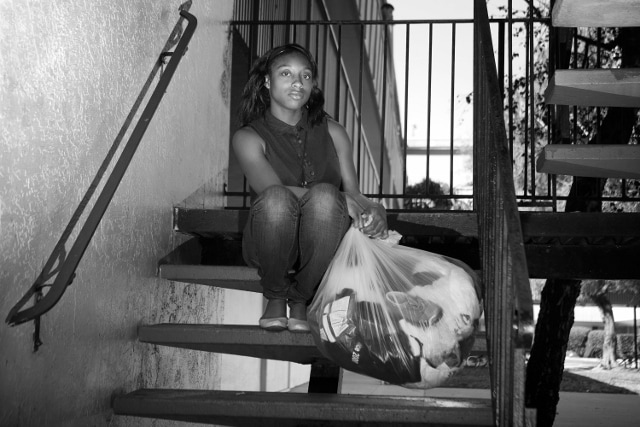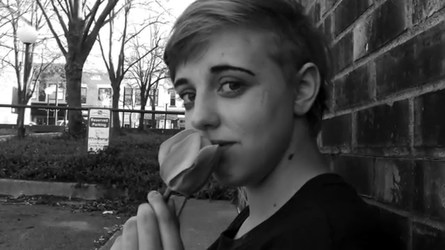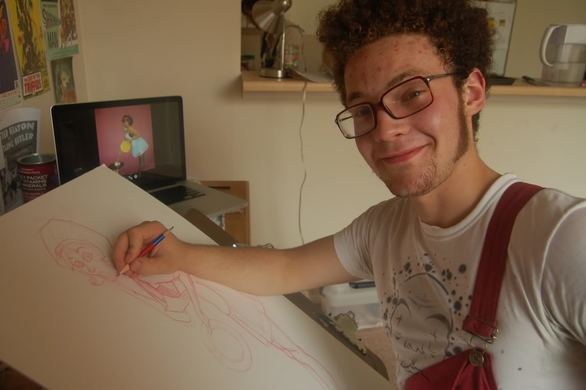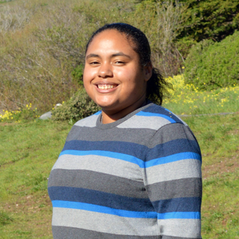Lost Childhoods: July 7 2017 – December 31 2017
Photograph by Ray Bussolari
Lost Childhoods showcases the stories, struggles, and triumphs of transition-age foster youth across California. This exhibition is powerful platform for dialogue and action in Santa Cruz County.
Lost Childhoods is a creative collaboration with the MAH’s C3 (Creative Community Committee), which includes the Foster Youth Museum, artists, foster youth, and advocates to empower youth to share their often-hidden experiences transitioning out of the foster care system, using art, artifacts and stories to inspire community awareness, social action, and individual engagement.
This exhibition of photographs, artifacts, and commissioned art installations is contextualized in the sweeping change of AB403 and rooted in the voices of transition-age foster youth.
There are four big ideas, developed by C3, at the core of this exhibition.
Visitors will:
Lost Childhoods showcases the stories, struggles, and triumphs of transition-age foster youth across California. This exhibition is powerful platform for dialogue and action in Santa Cruz County.
Lost Childhoods is a creative collaboration with the MAH’s C3 (Creative Community Committee), which includes the Foster Youth Museum, artists, foster youth, and advocates to empower youth to share their often-hidden experiences transitioning out of the foster care system, using art, artifacts and stories to inspire community awareness, social action, and individual engagement.
This exhibition of photographs, artifacts, and commissioned art installations is contextualized in the sweeping change of AB403 and rooted in the voices of transition-age foster youth.
There are four big ideas, developed by C3, at the core of this exhibition.
Visitors will:
- understand the authentic experience of foster care from a youth’s perspective.
- feel empowered to take action and know how to do so.
- have a visceral, emotional experience that sparks empathy.
- understand that this is a foster youth-driven project that welcomes and empowers foster youth.
|
May 03, 2010|By Ruben Vives, Los Angeles Times YOU CAN CALL HIM MAX For most of his life, Max Pauson didn't have a given name. Thanks to a law firm, the former foster youth received an official moniker — and now he's an art student in Pasadena. |
For most of his life, Max Pauson was the boy without a name — a given name, that is.
For reasons Pauson doesn't fully understand, his mother never got around to giving him a first and middle name. Hospital administrators, who had to submit a record of birth to the state's Office of Vital Records, eventually filled in the blanks, dubbing the infant "Baby, Boy, Pauson."
"I guess my mother never gave me a name," said Pauson, 20. "She was indecisive, I guess that's the reason."
Oddly enough, it wasn't until recently that Pauson realized he was listed so generically on his birth certificate. Growing up with his mother in and out of homeless shelters, and then in foster care, he was always called "Max Jr."
"My mother's name was Maxine and everyone was calling her Max for short, and they would call me Max Jr., so I was officially Max to everyone who knew me, but not on my birth certificate," Pauson said.
When it came time to apply for work, Pauson was told he was ineligible: the name on his Social Security card did not match the one on his birth certificate.
As a result, he was unable to apply for a part-time job while attending the Art Center College of Design in Pasadena. Employment was a requirement he needed to qualify for Youth Moving On, a transitional living program provided by Hillsides, a private nonprofit organization. The program provides foster youths with housing, therapy and life coaching.
Recognizing his inability to apply for a job, Hillsides sought help from the international law firm Howrey, which took on the case for free.
"The problem was that he lost a job because he could not be fingerprinted," attorney David Steuber said. "He needed to obtain a proper identity and a set of proper identity documents before he could move on with his life — literally."
Last year, after the necessary forms were filed, a Los Angeles County Superior Court judge in Pasadena approved the name of Maximus Julius Pauson.
Now, Pauson's a new man, at least on paper. On Sunday, he exhibited 13 art pieces in the Foster Care Project Art Show and Silent Auction at All Saints Church in Pasadena. Pauson is among the 39 current and former foster care youths in the exhibit.
But now that he has a name, displaying his artwork is only the beginning for Pauson. He intends to write children's books when he graduates from college.
"I can move forward with all my plans," Pauson said. "It's going to be … a lot easier to do anything."
[email protected]
For reasons Pauson doesn't fully understand, his mother never got around to giving him a first and middle name. Hospital administrators, who had to submit a record of birth to the state's Office of Vital Records, eventually filled in the blanks, dubbing the infant "Baby, Boy, Pauson."
"I guess my mother never gave me a name," said Pauson, 20. "She was indecisive, I guess that's the reason."
Oddly enough, it wasn't until recently that Pauson realized he was listed so generically on his birth certificate. Growing up with his mother in and out of homeless shelters, and then in foster care, he was always called "Max Jr."
"My mother's name was Maxine and everyone was calling her Max for short, and they would call me Max Jr., so I was officially Max to everyone who knew me, but not on my birth certificate," Pauson said.
When it came time to apply for work, Pauson was told he was ineligible: the name on his Social Security card did not match the one on his birth certificate.
As a result, he was unable to apply for a part-time job while attending the Art Center College of Design in Pasadena. Employment was a requirement he needed to qualify for Youth Moving On, a transitional living program provided by Hillsides, a private nonprofit organization. The program provides foster youths with housing, therapy and life coaching.
Recognizing his inability to apply for a job, Hillsides sought help from the international law firm Howrey, which took on the case for free.
"The problem was that he lost a job because he could not be fingerprinted," attorney David Steuber said. "He needed to obtain a proper identity and a set of proper identity documents before he could move on with his life — literally."
Last year, after the necessary forms were filed, a Los Angeles County Superior Court judge in Pasadena approved the name of Maximus Julius Pauson.
Now, Pauson's a new man, at least on paper. On Sunday, he exhibited 13 art pieces in the Foster Care Project Art Show and Silent Auction at All Saints Church in Pasadena. Pauson is among the 39 current and former foster care youths in the exhibit.
But now that he has a name, displaying his artwork is only the beginning for Pauson. He intends to write children's books when he graduates from college.
"I can move forward with all my plans," Pauson said. "It's going to be … a lot easier to do anything."
[email protected]
From Our Perspectives:
A Photo Exhibit by LGBTQ Former Foster Youth in LA County
From Our Perspectives: Untold stories of LGBTQ youth in the Los Angeles foster care system is a community-based participatory research project. Through photovoice methodology, 17 LGBTQ-identified former foster youth, between the ages of 18-26 years old, are featured in this art exhibit. Our goal is to enhance public understanding and heighten consciousness of the experiences of LGBTQ foster youth in Los Angeles County while illuminating the visual voices of this resilient community.
Project Investigators:
Dr. Sarah Mountz (Social Work) & Dr. Moshoula Capous-Desyllas (Sociology)
In collaboration with Team Arcoíris, a group of current & former CSUN MSW students
Exhibition Dates:
Sat. Sept. 17 — Thurs. Sept. 22, 2016
Gallery Hours: Mon. — Sat. from 12 p.m — 4 p.m.
Thurs. 12 p.m. — 8 p.m.
Reception: Thurs., Sept. 22 from 5 — 8 p.m.
Venue:
West Gallery, Art and Design Center
Project Investigators:
Dr. Sarah Mountz (Social Work) & Dr. Moshoula Capous-Desyllas (Sociology)
In collaboration with Team Arcoíris, a group of current & former CSUN MSW students
Exhibition Dates:
Sat. Sept. 17 — Thurs. Sept. 22, 2016
Gallery Hours: Mon. — Sat. from 12 p.m — 4 p.m.
Thurs. 12 p.m. — 8 p.m.
Reception: Thurs., Sept. 22 from 5 — 8 p.m.
Venue:
West Gallery, Art and Design Center
Real Stories from Foster Youth- from Foster Club
The stories are written by the youth, for the youth.
Each youth below experienced foster care and shared their #fosteryouthvoice (link is external) in order to inspire, advocate, connect to other foster youth and to show that their voice can make a difference.
PRESENTED HERE are only a few of the 29 stories
available at FOSTER CLUB
The stories are written by the youth, for the youth.
Each youth below experienced foster care and shared their #fosteryouthvoice (link is external) in order to inspire, advocate, connect to other foster youth and to show that their voice can make a difference.
PRESENTED HERE are only a few of the 29 stories
available at FOSTER CLUB
|
A Story of Resiliency
I remember abruptly waking up to the sound of glass shattering and my baby sister screaming. I tried to look around in the darkness to figure out what was going on, but couldn't tell. My mother grabbed me and tried to hide me behind a rocking chair in the room. All of a sudden the room got bright and my mother froze. I remember looking through my mother's legs to see what was going on and saw three men standing in the doorway. My mother asked what they were doing in our home and what they wanted, but they weren't there to talk. One of the men pulled me from my mother and held me down as the other two men started beating my mom. After the man who was holding me let me go I immediately ran to my mother's side. The man stood over me and laughed a laugh that I will never forget before hitting me as well. Then the men just turned around and walked out of the room, one man stopping in front of my sister's crib to spit on her. I don't remember much of anything else about that night. The next day I woke up in a hospital bed with an IV in my arm screaming for my mother and freaking out because I didn't know how I got there. The nurse came into my room and tried to calm me down but all I kept saying was "Where is my Mommy?" I will never forget the words the nurse said to me, "You can see her as soon as she gets out of surgery." I was only three years old at this time and had no clue what surgery was. I remember the first time I was allowed to see my mother, I was so happy, until I actually saw her. I walked into the room and didn't recognize her and started crying and yelling "That's not my Mommy! Where's my Mommy?" The nurse assured me that it was indeed my mother, but I kept refusing. The person I was looking at looked nothing like my mother; this person's face was swollen and black and blue and this person had casts on both legs. It took about two weeks for me to realize that it was her. During the next two weeks my sister and I stayed with my mother's best friend. When my mother was released from the hospital she got my sister and I back from her friend and she took us to a battered woman's shelter. We lived there for a while until my mom got back on her feet and found a new apartment. By this time I was probably almost five years-old and my sister about two. My mother was still dealing with everything that had happened to my family and decided that at five years old I was old enough to care for myself and my baby sister. She began drinking. For the next ten years of my life my mother drank heavily, eventually getting to the point where she couldn't function unless she was drunk. During these ten years I was the parent in the household; I cooked, cleaned and looked after my sister. My mother's best friend's son helped me do the things I couldn't. By the time I was fifteen my mother's drinking had gotten out of hand. She drove drunk all the time and had been in multiple hit and runs. Everyone realized it, including my mother. My mother called the Department of Children and Families to come and get me, which meant I was entering foster care. My sister's father came and got her and then my mother entered a rehab facility. She has been sober for three years at the end of August. Despite all the hardships I've faced and overcome: being thrown into adulthood at such a young age, having to be a parent to my sister, overcoming my past and emotionally dealing with it all, I have come out with a positive perspective on my life. To me resiliency is having the strength to overcome obstacles and challenges that get in the way of a person being successful. One of the only reasons that I was able to continuously be resilient at such a young age was because whenever I looked around me, no matter what else was going on, all I saw was my baby sister. One of the things she did when I looked at her was to smile with such a cute baby smile that always made my heart tingle. Her smile made me fight harder for her to make sure she always had everything she needed. I thought that there was no one else who could or would take care of her, and was too young to know what DCF was at the time. Just because my mother had her issues didn't mean that my innocent baby sister should have had to suffer, so I made sure she didn't. I have had resilience throughout my life with all of the struggles and challenges that I have faced and will have resilience when dealing with future struggles or challenges. In my future resiliency will be my ability to push myself harder and further, because I want to ensure that I will be in a better place than my mother. After seeing all that she has been through pushes me to do better for myself. -- FosterClub All-Star Heather Marone, Although Heather now lives independently, she has been in the foster care system for five years and has lived in five different placements. Heather is currently working as a certified EMT-B and attending classes to obtain her EMT-I certification. She also plans to obtain her BSW. Her future career goal is to work on Capital Hill to reform the foster care system. Heather is a member of her local youth advisory board and the New England Youth Coalition. Heather is a Starbucks addict, flip flop fanatic, music fiend... and a foster kid. Veda's Story
At a very young age, about six months old, I was removed from my parents care and placed in the foster care system. It took months for my caseworker to get in contact with my maternal grandmother. By the age of two, my grandmother was able to gain full custody of me. I was in kinship care until the age of eighteen, after losing my grandmother due to a disease called multiple sclerosis, commonly referred to as MS. Throughout high school, I endured many hardships with my identity and belonging, my grandmother's’ illness, and my sexuality. I had troubles with my identity because I didn’t know where I belonged or what group at school I was to associate myself with. I struggled due to my ethnicity. I am multi-racial: Mexican, Puerto Rican, and African-American. Hispanic individuals would tell me I was not Hispanic because I did not speak Spanish, or I was accused of only being a race when it benefited me even though I identified as multiracial. Growing up, and even now, society labels individuals and if a person may not fit in, they are often left to feel outcasted. It was around the same time in high school, when my grandmother started losing her battle with MS. We lived by ourselves, so I had to learn how to care for her. Junior year of high school, I was missing school about once a week to stay home with her. She became bed-bound and un-mobile after becoming ill with pneumonia, which weakened her body. By my senior year, I was staying home twice a week. I started to lose interest in school and could have used another supportive adult in my life to push me, to be interested in my education. The last hardship I endured was being open about my sexuality. I was afraid about coming out because I wasn’t sure how people would view me, judge me. Even though I was smart and interested in higher education, I was afraid coming out as a lesbian would overshadow all my other attributes - that I would eternally be looked at as “the lesbian” and not as “the student” or “the friend.” Which is what happened. It didn’t matter that I was working hard through my struggles to graduate high school on time, all my friends’ parents could see was that I was different and they became afraid I was going to turn their daughters gay. Friends were forbidden to hang out with me. I was being prejudged solely on my sexuality. The first person I came out to, was my best friend in middle school. (We are still best friends today.) In seventh grade, we were on the phone and talking. She asked if I was coming out to her and I said yes. She said, “Cool, I accepted it.” Having that support helped me get through the hardships. After high school, I finally came out to my grandfather, and he was not supportive of me at first. He told me, “I don’t like it, but I will learn to accept it.” It hurt me, because the one family member I had left for guidance and support, did not fully accept me because of my sexuality. As I got more involved in school and programs, I found supportive adults who did not judge me, but instead accepted me and invited me into a comfortable, supportive and lovable environment. I started to get involved with programs such as Guardian Scholars at Los Angeles City College, California Youth Connection, and FosterClub. As I became a part of these organizations and met other foster youth, I found out that they shared similar experiences. These similarities varied from sexuality, identity, and wanting to belong. As I grow closer with individuals from each organization, I noticed a positive change in myself. Soon, my grandfather became more involved with my education and even asked me about my girlfriend. I’ve learned sometimes acceptance takes time, especially when dealing with older generations and their moral beliefs from their upbringing. Some advice I would give other LGBTQ youth that are still in the system is to be yourself. At the end of the day, all you have is yourself. Focus on what makes you happy and work to be successful at it. It may be hard at first, because you may have peers and even adults that will tell you that they do not agree with who you are. That is where you, as an individual, have to make the decision if they will benefit you or not because it is your life, no one can live it for you. I want the general public to know that LGBTQ youth that are in the child welfare system are just like every other youth that are in the system. We all go through hardships and downfalls, but we are all human. At the end of the day, we just want someone to be by our side, support us, and let us know that we’re worth it; that we’re destined to succeed. Grandma always told me to be somebody and go far in life. “Don’t be like your mom, don’t do drugs, go to school and get an education.” Learn more about Veda... read her Bio |
Maintaining Your Cultural Identity
I was raised as a Chinese American speaking Cantonese fluently and some Tosanese with my grandma. When I entered foster care at the age of 12, I was no longer my own person. I was told by others on how I should act and behave based on their cultural expectations. I had to fit a "mold" that wasn't made for me to fit in. I lived with four different families and spent five years in foster care. When I aged out of the foster care system, I began to find a stronger voice within myself and for others to hear. As a former foster youth and a person of color, I advocate for youth to overcome cultural barriers, embrace diversity, and finding you own "voice" in the foster care system. 2005 All-Star Theresa Moy spent 5 years in foster care in Minnesota. As an advocate for youth in foster care, Theresa would like to help Minnesota youth overcome the many cultural issues as she did, and actively participate to improve the system. Learn more about Theresa Breaking the Cycle
2009 FosterClub All-Star Kita Anderson wrote the following piece(link is external) for the Federation of Protestant Welfare Agencies (FPWA)(link is external) Going to graduate school to achieve my dream of becoming a social worker after overcoming a harsh beginning is the only way for me to give back to my community and make a difference for the 513,000 children and youth in care in the United States. My experience in the foster care system has greatly influenced my interest in working in the Social Work field. I am specifically interested in working with other foster youth and families. Having survived a beginning of abuse, neglect, emotional and physical trauma, I can only look to helping others when they are in need. When I was 5 years old, I entered the foster care system but was separated from my four other siblings. I did not reunite with them again until 13 years later. This severe and sudden separation from my siblings had a profound impact on my development. My older sister had become my surrogate mother while my birth mother was out on her drinking binges, even though she was still a child herself. She would make sure my siblings and I were taken care of and had everything we needed. I relied on her when I needed her most. But by entering foster care, I was uprooted from all that I had known and I had a hard time adjusting to a new, strange environment. School was the only stability for me so I invested all my energy and time into my studies with enthusiasm and complete dedication. Graduate school is the most important stepping stone for me to accomplish my goals. I always knew as a child that attending college was imperative to work with children in a professional setting. I know that I could probably find work without going to Graduate school and receiving my Master's; however, I feel I do not have enough education to enter the workforce just yet. I have always been interested in other people's stories, cultures and traditions. Attending Graduate school would give me the opportunity to expand my knowledge and experiences to give back even more once I start working. After I graduate with my MSW from Columbia University, I plan on traveling the world for a year to experience other cultures and open my mind to different backgrounds. I have traveled some when I was a child, but I feel I need the extra understanding of diversity. In five to six years, I want to have established a stable position working with foster youth and their families. I am interested in living in my home state (Colorado) and making a difference in the same county that I grew up in. Boulder County has a great Social Services system, but as with anything, it can improve. I want to be an inspirational Social Worker, making it my priority to keep families together as much as possible. I did not have the best case worker during my second stint in foster care, which has made me think about what she could have done better. I would like to be one of those social workers that has it all together and can go above and beyond just the minimum of being a caseworker. I want to make a difference in a foster child's life in a major positive way. Read another Real Story from Kita about her relationship with her sister titled The Unbreakable Bond FosterClub All-Star Kita Anderson is a youth advocate, chocoholic, avid-reader… and a foster kid. learn more about Kita... Being Happy—in Spite of Rejection by My Birth Family for Being Gay
The following story was featured in the Fall 2009 Issue of The Connection Magazine, from CASA(link is external) Download Original Story(link is external) Learn more about the Connection Magazine(link is external) From my birth, being gay has been against my family’s way of life. Because of my family and their religious views, my journey through the foster care system began at the young age of 12. When my family disowned me for being gay, I was completely side-struck. I felt I was alone. I believed that I was the only gay kid around. I now am openly gay and happy with life. But it wasn’t easy getting to this point. Growing up in care in our society can be a struggle. Being of the LGBTQ community while also being in care makes it an even greater challenge for a young person. I know it was for me. I had many challenges while being in care and being gay. I didn’t know where to go to find resources; I felt I didn’t have any supportive adults; and my relationships always seemed to fail. Growing up in the system, the importance of equality and being treated equally would have helped me more than anything. Many times I felt alienated. On numerous occasions I was treated differently from my peers. Many LGBTQ youth in care feel that they are being treated unfairly. Having adults who can simply be the support that we need, no matter who we are, is extremely important. For CASA volunteers, it’s vastly important to understand the needs of an LGBTQ youth. It’s very common that gay or transgender youth in care have been exposed to some form of sexual abuse. You should take into consideration the importance of the young person’s voice. Ask yourself this: Would a youth be comfortable in a specific situation? For example, in an all female or male setting? In a single-parent home? In an independent living program? Personally being placed into many group homes, I felt unsafe because of my history of abuse. I know that a CASA volunteer would have helped me “amplify my voice” to let my needs become heard. Because I unfortunately did not have a CASA or a specific supportive adult when I had times of struggles and abuse, I had to become very “head smart” in life. I constantly kept to myself, isolated from the world around me. I looked up to certain people. Whether it was someone real or fictional in my life, I looked up to many, many adults. In my mind I kept telling myself that I was going to be a better person. I know from experience that being in the system is tough, especially being LGBTQ. I had to become a positive person. But becoming that positive and successful person wasn’t easy. I had to be resourceful and find the help that I needed. There were plenty of websites, organizations and other resources that I constantly looked up for advice, optimism and hope. Some of those were books! I read books very often to have a sense of freedom from my reality. I read to ”get away.” One of the ways I did find hope was through the YouTube website, where basically anyone can upload and share videos on any topic. Whenever I needed an answer or some form of advice, I went to YouTube. I was able to hear personal stories and advice from people my own age, from around the world. It gave me hope that one day I would become happier. Years later, I am a happy individual. It took a lot of self-help, research and reaching out, but I am proud of the person I have become. Currently I am enrolled in college full time. I am in my junior year, and I participate in the campus color guard. I am double-majoring in social work and film and media studies. I want to take my skills and talents working with the media to help the foster care system and advocate for those in care—especially those who are LGBTQ. I also am the 2009–2010 FosterClub All-Star Michigan representative. FosterClub gives me the opportunity to help the system and advocate for young people in foster care. Because let’s face it: Who’s going to make a change if we don’t step up to the plate? Tobias Rogan, 19, was selected through a competitive national application process to serve as one of 12 FosterClub All-Star interns. The All-Stars travel the country motivating and informing their peers, providing child welfare professionals with the perspective of youth and raising public awareness. To learn more, visit fosterclub.com. Tobias studies at Western Michigan University. He is also a photographer and provided the self-portrait above. |
|
|
|
|
|
|
|
|
|
Your success lights the way for the future generations of foster youth.
What is possible for you can only be defined by you. Accept no limitations.
What is possible for you can only be defined by you. Accept no limitations.










